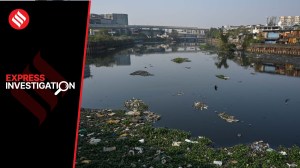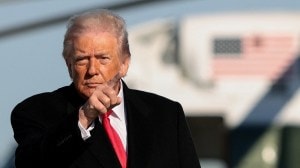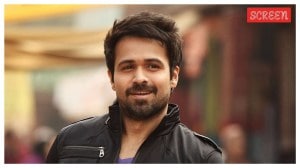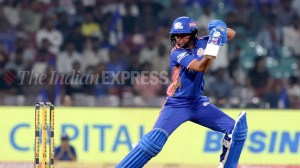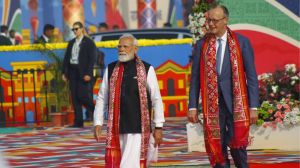Tehran Diary
The last-minute voterIran's crucial Presidential elections kick off today, but it8217;s hardly evident on the streets of Tehran. Election f...

The last-minute voter
Iran8217;s crucial Presidential elections kick off today, but it8217;s hardly evident on the streets of Tehran. Election fever has been conspicuous by its absence in this city of 12 million people that boasts of snarling traffic jams and throat-racking pollution levels. Sure, there are a few posters here and there, but it took an entry ticket to the soccer World Cup in 2006 to get Iranians onto the street for an impromptu party.
What8217;s going on? 8216;8216;Anything can happen,8217;8217; avers Amin Sabooni, the outspoken editor of the English newspaper Iran Daily. Voter ennui would work in favour of front-runner and former president Hashemi Rafsanjani, but nobody is writing off reformist candidate Mostafa Moin, whose popularity has been climbing in the past few days. Iranians are known to be last-minute voters, and could well swing a surprise. If it goes to a second round face-off between Rafsanjani and Moin, anything could indeed happen.
Winds Of Change
Anyone who has read Marjane Satrapi8217;s graphic novels on life in Iran8212;Persepolis, I and II8212;cannot but keenly observe the role of women since the revolution in 1979. Sure, the headscarf and cloak are still the uniform for all women, but there are not-so-subtle changes. The scarves now show a fair bit of hair, and the cloak is now at a fashionable knee-length, displaying designer jeans and sometimes even a flash of leg. Women drivers negotiate the tough roads of Tehran8212;where taking curves at 140 kmph is the norm8212;with aplomb. Young couples 60 per cent of Iran8217;s population is below the age of 20 hold hands on the street and the cosmetics industry is booming. The women journalists I spoke to knew English better than their male counterparts. Intelligent and assertive, many say women hold the key to Iran8217;s economic future. At least some appear to be showing the way.
Sanction talk
Apart from the pollution levels, an air of US sanctions hangs heavy on Iran8217;s economy. The large lobby of North Tehran8217;s The Parsian Esteghlal hotel8212;which has a Soviet-era air of neglect and watchfulness to it8212;is buzzing with businessmen and women talking shop. Most are from European countries, though one did spy a smattering of Indian professionals8212;English-speaking lawyers are in demand. Jean Christophe Fassel from German firm Thyssen Krupp, in Tehran to negotiate an outsourcing deal for auto components, shrugs when asked about the possibility of EU joining the sanctions. 8216;8216;If that were so, I wouldn8217;t be here. For us, it8217;s business as usual.8217;8217; Most Iranians don8217;t expect the situation to intensify in an economy that needs to broadbase out of oil and gas and automobiles. After years of war and sanctions, Iran desperately wants to get back on track. The question is, will it be able to?
Mr Penn, I Presume
That8217;s my opening line to Hollywood actor Sean Penn, who I bump into while carpet shopping in Tehran8217;s sprawling Bazaar Buzurgh. Penn8212;who has acted in modern classics like Dead Man Walking and Mystic River8212;is in Iran as a reporter for the San Francisco Chronicle, perhaps the first Hollywood star to visit since 1979. 8216;8216;Are you staying for the elections,8217;8217; he asks me as the carpets were being rolled open around us. When I tell him I am accompanying India8217;s Petroleum Minister who is signing a mega deal for liquified natural gas, he nods and says that he has read about 8216;8216;the LNG stuff8217;8217;. 8216;8216;Isn8217;t it dangerous for an American to be in Tehran,8217;8217; I ask him. Penn8217;s reply: 8216;8216;It8217;s dangerous if you don8217;t get home. If you do, then it8217;s not.8217;8217; Penn will definitely get home as his invite has the sanction of the Iranian government. A cigarette later, he was gone. No carpets were bought.
Metro Madness
Ask Hasan, my affable taxi driver, how long it8217;ll take to reach a destination, the answer typically is: 8216;8216;It depends.8217;8217; An hour on the road can easily stretch to two, even more. So, one afternoon, a couple of us got on to Tehran8217;s two-year-old metro. It not only was cheap, we got to our destination in 20 minutes. And it was spanking clean.
- 01
- 02
- 03
- 04
- 05








